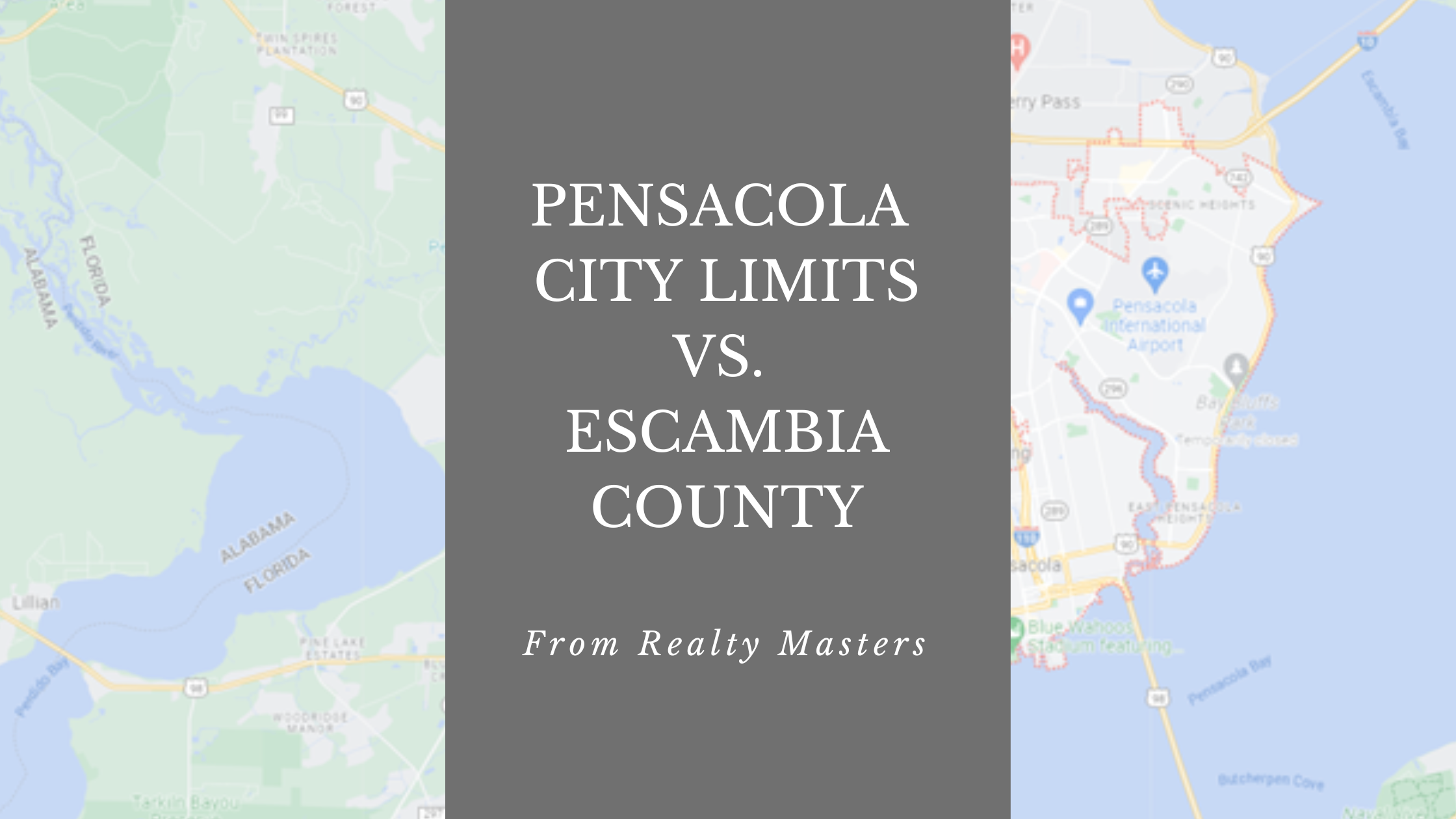Are you unsure whether your home or the home you are interested in renting or buying is in The City of Pensacola or Escambia County? It’s important to understand the jurisdictional control of each when living in Pensacola.
Most homes located in Southeast Pensacola and Downtown Pensacola, as well as properties in the Pensacola zip codes 32501, 32502, 32503, and 32504, are located within city limits of Pensacola. Some of the largest and most popular neighborhoods located in the city limits include Downtown Pensacola, Belmont-Devilliers, East Hill, North Hill, East Pensacola Heights, and Cordova Park. It also includes a large commercial area including Pensacola Airport and Cordova Mall.
You can see from the map below what the city limits encompass and that more properties are actually located within Escambia County versus the City of Pensacola.
You can determine the taxing authority by searching the property address in the Escambia County Property Appraisers website here. Search by address, view the property records and find “taxing authority” in the General Information area near the property address. For a more detailed city limit map view, visit the City of Pensacola's GIS map system.
The main jurisdictions in Pensacola are:
Both the City of Pensacola and Escambia county have the ability to tax as well as their own government, utility and police departments. Thus, there are a few major differences between living in the Pensacola City limits and Escambia County. Here are the major differences:
- Property taxes
- Utility providers
- City of Pensacola Government vs Escambia County Government
- The Pensacola Police Department vs. Escambia County Sheriff's Office
Property Taxes: City of Pensacola and Escambia County
When you own a home in the City of Pensacola, you must pay an additional tax rate to the city government. If your home falls outside the City limits, you are only liable for county taxes. In 2023, the total millage rate for properties located in Escambia County was about 13.3971. Properties located in the City of Pensacola were taxed on a millage rate of 17.0016 because of the 4.2895 city millage rate. City residents do not pay the .6850 millage rate to Escambia County Sheriff's office as county residents do. Currently, based on an assessed value of $200,000, you would see an additional tax bill of an estimated $750 annually on a non-homestead property for residing in the city.
Additionally, select properties located in the heart of Downtown Pensacola are subjected to an additional millage rate of 2 to fund the Downtown Improvement Board. These properties are mainly commercial properties located North and South of Garden St. And East and West of Palafox Street. Check the boundaries on their website.
For more information about property taxes in Escambia County, visit the Escambia County Tax Collector.
Utilities: City Sanitation Trash Service & Gas
The City of Pensacola has its own utility company who provides natural gas and trash service inside the city limits. In the county limits, residents use ECUA (Emerald Coast Utilities Authority) for water, sewer, and trash, while in the city limits, residents must utilize trash service through The City of Pensacola and water through ECUA. Interestingly enough, Pensacola Energy, operated by the City of Pensacola, provides gas for most of Escambia County.
Need to set up utilities in the City of Pensacola? To begin trash service in the City limits of Pensacola, call (850) 435-1890 or gas service anywhere in Pensacola, call (850) 435-1800. To begin water service anywhere in Pensacola, call ECUA at (850) 476-0480.
Police Jurisdiction and Fire Departments
In the city limits, the Pensacola Police Department handles all police matters while in the county, Escambia County Sheriff's Office has jurisdiction.
Likewise, the City of Pensacola Fire Department handles fire safety in the city while Escambia County Fire Department manages fires in the county.
City of Pensacola Government vs. Escambia County Government
Where you live matters when it comes to local government, as these governing bodies do so much. The city and county have separate ordinances, permitting offices, road departments, code enforcement offices, public works, park systems and much more. The City of Pensacola has a mayor and elected members on the City Council who handle local affairs while Escambia County has elected Board of County Commissioners who govern. Check the city and county websites for links to public works and other government services.
Is living in the city or county better?
We may be partial, but we love both. The city limits is a smaller geographic area so most residents live outside the city limits in Escambia County. Those who prefer to be near downtown may prefer living in the city limits while those who want a little more rural feel will surely choose the county.
Because of the differences listed above, homes located in the City Limits of Pensacola do tend to come with slightly increased costs. Many properties in the city limits are older in construction and closer to the water, so we’ve noticed, on average, they also come with slightly higher insurance costs, as well as the increased taxes and extra utility bill. We do believe though, that whether you live in the city or the county, you will love the Pensacola area! If you’re looking for a Pensacola home to buy or sell, reach out to our team.



